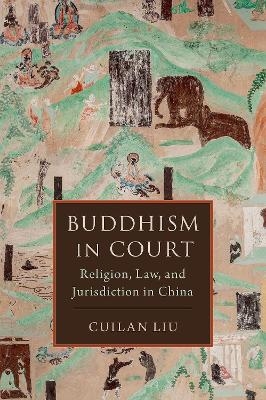
Buddhism in Court
Religion, Law, and Jurisdiction in China
Seiten
2024
Oxford University Press Inc (Verlag)
978-0-19-766333-2 (ISBN)
Oxford University Press Inc (Verlag)
978-0-19-766333-2 (ISBN)
Buddhism in Court is the first English language study of the legal interaction between Buddhism and the state in China. It uncovers a long-overlooked Buddhist campaign for clerical legal privileges that aimed to make ordained Buddhist monks and nuns immune from facing trials and punishment in the state court.
What happens to Buddhist monks and nuns who commit crimes? Buddhism in Court is the first book to uncover an important, yet long-overlooked, Buddhist campaign for clerical legal privileges that aim to exempt monks and nuns from being tried and punished in the government courts. Liu reveals the campaign's origins in Indian Buddhism and how Chinese Buddhists' engagement reshaped Buddhism's place in the jurisdictional landscape in China from the fourth century to the present.
Drawing on Buddhist monastic law texts, archives, court documents, Chinese laws, official histories, law case books, institutional announcements, and private writings circulated on social media, Buddhism in Court traces the legacy of the campaign for clerical legal privileges from its origin in India to its transformation in China and its continuing impact in the Chinese courtroom to the present day. Diverting from the dynasty-centered approach to studying religion, law, and history in China, Buddhism in Court expands our understanding of this legacy of early Chinese Buddhism and challenges the notion that the transition between imperial and post-imperial China was marked only by disruption.
What happens to Buddhist monks and nuns who commit crimes? Buddhism in Court is the first book to uncover an important, yet long-overlooked, Buddhist campaign for clerical legal privileges that aim to exempt monks and nuns from being tried and punished in the government courts. Liu reveals the campaign's origins in Indian Buddhism and how Chinese Buddhists' engagement reshaped Buddhism's place in the jurisdictional landscape in China from the fourth century to the present.
Drawing on Buddhist monastic law texts, archives, court documents, Chinese laws, official histories, law case books, institutional announcements, and private writings circulated on social media, Buddhism in Court traces the legacy of the campaign for clerical legal privileges from its origin in India to its transformation in China and its continuing impact in the Chinese courtroom to the present day. Diverting from the dynasty-centered approach to studying religion, law, and history in China, Buddhism in Court expands our understanding of this legacy of early Chinese Buddhism and challenges the notion that the transition between imperial and post-imperial China was marked only by disruption.
Cuilan Liu is Assistant Professor in the Department of Religious Studies at the University of Pittsburgh. Her research focuses on the intersection of Buddhism and the Law in China, Tibet, and India.
List of Figures
Abbreviations
Acknowledgements
Introduction
Part I: Indian Origins
1. Litigation Ban
2. The Adulterous Wife's Sanctuary
3. Buddhist Killers at Large
4. Withered Orchid and Dead Ox
Part II: In the Chinese Courtroom
5. Hybrid Courts, Hybrid Laws
6. A Fallen Abbot
7. Dead Monks, Living Heirs
Epilogue
Notes
Bibliography
Index
| Erscheinungsdatum | 25.04.2024 |
|---|---|
| Zusatzinfo | 8 |
| Verlagsort | New York |
| Sprache | englisch |
| Maße | 236 x 130 mm |
| Gewicht | 680 g |
| Themenwelt | Geschichte ► Teilgebiete der Geschichte ► Militärgeschichte |
| Geisteswissenschaften ► Religion / Theologie ► Buddhismus | |
| Recht / Steuern ► Rechtsgeschichte | |
| ISBN-10 | 0-19-766333-8 / 0197663338 |
| ISBN-13 | 978-0-19-766333-2 / 9780197663332 |
| Zustand | Neuware |
| Haben Sie eine Frage zum Produkt? |
Mehr entdecken
aus dem Bereich
aus dem Bereich
neueste Manipulationstechniken als Waffengattung der NATO
Buch | Softcover (2023)
Westend (Verlag)
CHF 33,55


